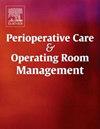Clinical rotation model to foster a positive experience in the operating room
IF 1
Q2 Nursing
Perioperative Care and Operating Room Management
Pub Date : 2025-07-26
DOI:10.1016/j.pcorm.2025.100531
引用次数: 0
Abstract
Operating room (OR) nursing is a subspecialty within nursing that includes the care of patients undergoing surgical procedures. Incorporating students into OR clinical experiences can be challenging as the environment is fast paced, complex, and highly technical. Traditionally, students in the OR spend time shadowing with little to no hand-on care opportunities, which does not allow final semester nursing students to meet the clinical course objectives. Therefore, the course faculty and hospital unit leadership collaborated to develop a clinical experience that met the course objectives.
The rotation was structured to link OR nursing didactic content to clinical learning, enhance technical skills, and foster critical thinking and teamwork in a high-pressure setting. Feedback was collected from students and preceptors to gain insights into their perspectives on the rotation; both students and preceptors agreed that the rotation was worthwhile and beneficial, recommending its continuation. By integrating student preferences, fostering collaboration with unit leadership, and implementing feedback-driven improvements, this model creates a supportive learning environment that prioritizes patient safety while providing the learner with an experience to develop skills and critical thought necessary for OR nursing roles.
临床轮转模式,营造积极的手术室体验
手术室护理是护理学的一个分支,包括对接受外科手术的病人的护理。将学生纳入手术室的临床经验可能具有挑战性,因为环境快节奏,复杂和高度技术性。传统上,在手术室的学生花时间跟随很少或没有实际护理的机会,这使得最后学期的护理学生不能满足临床课程的目标。因此,课程教师和医院单位领导合作开发临床经验,以满足课程目标。轮岗的结构是将手术室护理教学内容与临床学习联系起来,提高技术技能,并在高压环境中培养批判性思维和团队合作。收集学生和导师的意见,了解他们对轮岗的看法;学生和导师都认为轮岗是值得的,有益的,建议继续进行。通过整合学生的偏好,促进与单位领导的合作,并实施反馈驱动的改进,该模式创造了一个支持性的学习环境,优先考虑患者的安全,同时为学习者提供了培养技能和批判性思维的经验,这是手术室护理角色所必需的。
本文章由计算机程序翻译,如有差异,请以英文原文为准。
求助全文
约1分钟内获得全文
求助全文
来源期刊

Perioperative Care and Operating Room Management
Nursing-Medical and Surgical Nursing
CiteScore
1.30
自引率
0.00%
发文量
52
审稿时长
56 days
期刊介绍:
The objective of this new online journal is to serve as a multidisciplinary, peer-reviewed source of information related to the administrative, economic, operational, safety, and quality aspects of the ambulatory and in-patient operating room and interventional procedural processes. The journal will provide high-quality information and research findings on operational and system-based approaches to ensure safe, coordinated, and high-value periprocedural care. With the current focus on value in health care it is essential that there is a venue for researchers to publish articles on quality improvement process initiatives, process flow modeling, information management, efficient design, cost improvement, use of novel technologies, and management.
 求助内容:
求助内容: 应助结果提醒方式:
应助结果提醒方式:


